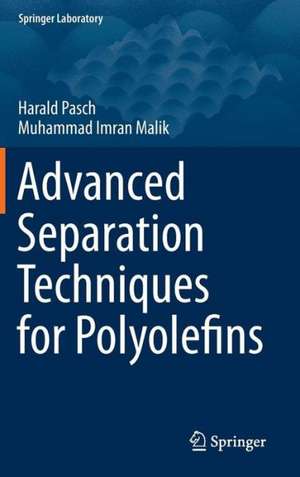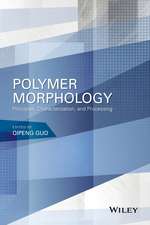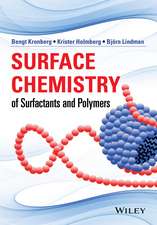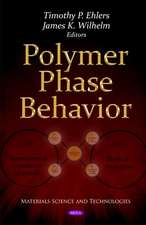Advanced Separation Techniques for Polyolefins: Springer Laboratory
Autor Harald Pasch, Muhammad Imran Maliken Limba Engleză Hardback – 9 sep 2014
| Toate formatele și edițiile | Preț | Express |
|---|---|---|
| Paperback (1) | 382.18 lei 6-8 săpt. | |
| Springer International Publishing – 23 aug 2016 | 382.18 lei 6-8 săpt. | |
| Hardback (1) | 389.49 lei 6-8 săpt. | |
| Springer International Publishing – 9 sep 2014 | 389.49 lei 6-8 săpt. |
Din seria Springer Laboratory
- 15%
 Preț: 637.75 lei
Preț: 637.75 lei -
 Preț: 383.93 lei
Preț: 383.93 lei - 18%
 Preț: 783.05 lei
Preț: 783.05 lei - 15%
 Preț: 645.47 lei
Preț: 645.47 lei -
 Preț: 394.29 lei
Preț: 394.29 lei -
 Preț: 384.86 lei
Preț: 384.86 lei - 15%
 Preț: 642.18 lei
Preț: 642.18 lei - 18%
 Preț: 785.11 lei
Preț: 785.11 lei -
 Preț: 384.48 lei
Preț: 384.48 lei - 15%
 Preț: 636.92 lei
Preț: 636.92 lei - 15%
 Preț: 645.60 lei
Preț: 645.60 lei - 15%
 Preț: 660.49 lei
Preț: 660.49 lei - 15%
 Preț: 642.51 lei
Preț: 642.51 lei - 18%
 Preț: 953.65 lei
Preț: 953.65 lei - 18%
 Preț: 895.76 lei
Preț: 895.76 lei - 15%
 Preț: 645.79 lei
Preț: 645.79 lei - 15%
 Preț: 644.30 lei
Preț: 644.30 lei -
 Preț: 385.84 lei
Preț: 385.84 lei - 15%
 Preț: 580.46 lei
Preț: 580.46 lei
Preț: 389.49 lei
Nou
Puncte Express: 584
Preț estimativ în valută:
74.53€ • 77.82$ • 61.54£
74.53€ • 77.82$ • 61.54£
Carte tipărită la comandă
Livrare economică 15-29 aprilie
Preluare comenzi: 021 569.72.76
Specificații
ISBN-13: 9783319086316
ISBN-10: 3319086316
Pagini: 191
Ilustrații: XII, 179 p. 121 illus., 44 illus. in color.
Dimensiuni: 155 x 235 x 17 mm
Greutate: 0.45 kg
Ediția:2014
Editura: Springer International Publishing
Colecția Springer
Seria Springer Laboratory
Locul publicării:Cham, Switzerland
ISBN-10: 3319086316
Pagini: 191
Ilustrații: XII, 179 p. 121 illus., 44 illus. in color.
Dimensiuni: 155 x 235 x 17 mm
Greutate: 0.45 kg
Ediția:2014
Editura: Springer International Publishing
Colecția Springer
Seria Springer Laboratory
Locul publicării:Cham, Switzerland
Public țintă
GraduateCuprins
Part A Introduction.- Molecular Heterogeneity of Polyolefins.- Analytical Methods for Polyolefins.- Part B Crystallization-Based Fractionation Techniques.- Temperature Rising Elution Fractionation.- Crystallization Analysis Fractionation.- Crystallization Elution Fractionation.- Part C Column-Based Chromatographic Techniques.- Multidetector Size Exclusion Chromatography.- Solvent Gradient Interaction Chromatography.- Temperature Gradient Interaction Chromatography.- Two-Dimensional Liquid Chromatography.- Part D Field-Flow Fractionation.- Fundamentals.- Application of Field-Flow Fractionation of Polyolefins.- Analysis of Polyolefins by Asymmetric Flow FFF.- Conclusions and Future Trends.
Recenzii
“There are no books covering the scope of polyolefin characterization by separation techniques like this one. … The book will help both beginners and experienced researchers in the characterization of polyolefins. Advanced Separation Techniques for Polyolefins is a monograph that covers all separation technologies applicable to polyolefins. … The books is a valuable resource to everyone working on polyolefin characterization and provides an exceptional bibliography in the field.” (Benjamin Monrabal, Analytical and Bioanalytical Chemistry, Vol. 407, 2015)
Notă biografică
Harald Pasch holds the SASOL Chair of Analytical Polymer Science at the Department of Chemistry and Polymer Science, University of Stellenbosch, South Africa. He has great experience in analytical polymer science and polymer separation and fractionation techniques. His research is focused on the development of multidimensional analytical techniques for complex polymers, in particular efficient multi-dimensional coupling of separation methods and hyphenation of separation methods through complementary analytical methodology. Harald Pasch is one of the series editors of the series Springer Laboratory: Manuals in Polymer Science. He has co-authored successful books introducing to HPLC and Multidimensional HPLC of Polymers as well as MALDI-TOF Mass Spectrometry, which were very positively received in the community (cf. DOI 10.1007/s00216-014-7632-z). This latest book by Pasch and Malik now focuses on "Advanced Separation Techniques for Polyolefins".
Muhammad Imran Malik has a wide-ranging background in polymer science, including microwave-assisted synthetic strategies and a special focus on characterization and separation techniques for complex polymers. He has worked together with Harald Pasch as a postdoctoral fellow in developing multi-dimensional characterization techniques for polymers. He now holds a position as Assistant Professor at the H.E.J. Research Institute of Chemistry, International Center for Chemical and Biological Sciences (ICCBS) at the University of Karachi (Pakistan). His research focuses on Analytical Polymer Science.
Muhammad Imran Malik has a wide-ranging background in polymer science, including microwave-assisted synthetic strategies and a special focus on characterization and separation techniques for complex polymers. He has worked together with Harald Pasch as a postdoctoral fellow in developing multi-dimensional characterization techniques for polymers. He now holds a position as Assistant Professor at the H.E.J. Research Institute of Chemistry, International Center for Chemical and Biological Sciences (ICCBS) at the University of Karachi (Pakistan). His research focuses on Analytical Polymer Science.
Textul de pe ultima copertă
This Springer Laboratory volume introduces the reader to advanced techniques for the separation and fractionation of polyolefins. It includes detailed information on experimental protocols and procedures, addressing the experimental background of different polyolefin fractionation techniques in great detail. The book summarizes important applications in all major fractionation methods with emphasis on multidimensional analytical approaches. It comprises the most powerful modern techniques, such as high temperature size exclusion chromatography (HT-SEC) for molar mass analysis, temperature rising elution fractionation (TREF) and crystallization analysis fractionation (CRYSTAF) for the analysis of chemical composition and branching, high temperature two-dimensional liquid chromatography (HT-2D-LC), solvent and temperature gradient interaction chromatography (SGIC and TGIC) and crystallization elution fractionation (CEF).Beginners as well as experiencedchromatographers will benefit from this concise introduction to a great variety in instrumentation, separation procedures and applications. With detailed descriptions of experimental approaches for the analysis of complex polyolefins, the readers are offered a toolbox to solve simple as well as sophisticated separation tasks. The book starts with an introduction into the molecular complexity of polyolefins - the most widely used synthetic polymers with rapidly growing production capacities. It systematically discusses crystallization based fractionation techniques including TREF, CRYSTAF and CEF, and column chromatographic techniques for molar mass, chemical composition and microstructure, as well as the combination of different fractionations in multidimensional experimental setups. This book also includes basic information on the application of high-temperature field-flow fractionation.
Caracteristici
First comprehensive textbook on high-temperature fractionation techniques Introduces beginners as well as experienced chromatographers to advanced techniques for the separation and fractionation of polyolefins Describes a great variety in instrumentation, separation procedures and applications Provides a complete toolbox to solve both simple and sophisticated separation tasks for polyolefins - the most widely used class of synthetic polymers Includes supplementary material: sn.pub/extras










